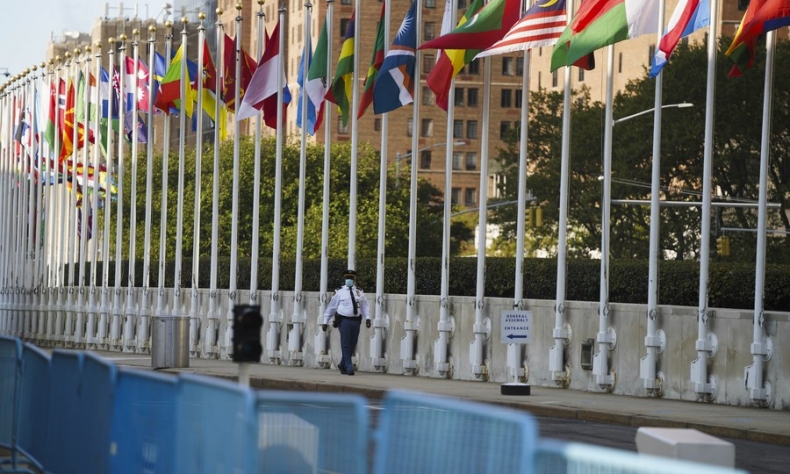Time to Abandon Cultural Chauvinism

The role of international laws and regulations needs to be given full rein to contain hegemony through justice and fairness, promote multi-polarization and drive global governance through extensive consultation and joint contribution for shared benefits.
At the former Kamloops Indian Residential School in British Columbia, Canada, investigators recently uncovered a mass grave with the remains of 215 children. After Canada passed the Indian Act in 1876, nearly 100 such indigenous boarding schools were opened across the country. The schools were aimed at assimilating aboriginal children and turning them into “civilized people” through education. According to NPR, this schooling system has its roots in the U.S. policy toward Native Americans.
Despite the lamentable human rights records of the United States, Canada and several European former imperialist nations, these same countries often like to use human rights as a political weapon to castigate countries that refuse to let the United States control their governments, central bank and foreign policy. Alleged “human rights abuses” are the tool par excellence in the new Cold War the U.S. is waging against China, Russia, Iran and oil-exporting countries that the United States does not control. By contrast, nations with appalling human rights records but which are subservient to U.S. hegemony are practically untouchable by Western media.
At his address to the St. Petersburg International Economic Forum, Russian President Vladimir Putin put it very succinctly, “The degeneration of the universalist globalization model is turning into a parody, a caricature of itself, where common international rules are replaced with the laws of one country.”
Double standards
Even Singapore, a developed country deeply influenced by Western-style democracy, bears the brunt of European and North American critics simply because its economic development model and legal practices differ from those of the West.
Asian, African and Latin American countries with an awareness of their national independence have also been attacked by the same people who apply double standards on “democracy,” “good governance,” “corruption” and the “rule of law.” Government institutions, politicians, non-governmental organizations and media outlets in the West often criticize developing countries and demonize them for not accepting Western hegemony.
The issue of national defense and security, too, is regularly reported in an extremely lopsided way. For instance, the annual military expenditure of the U.S. will exceed $738 billion in 2021—which, according to the International Institute for Strategic Studies, is roughly equal to next 14 countries combined, 12 of which are U.S. allies. However, the U.S. and its Western allies accuse developing countries that have stepped up their national defense spending to defend their national sovereignty and legitimate interests of being “aggressive,” “confrontational,” or “expansionist.”
The pride and prejudice of the West often shows itself in cultural exchanges. Some Western countries have set up cultural communication agencies in developing nations. Nevertheless, they appear unwilling to embrace cultural agencies from developing nations and reproach the latter for promoting local value and ideology.
In recent years, the U.S. has pushed its allies to abandon 5G equipment manufactured by China’s tech giant Huawei under the pretense of “national security.” In light of this, the U.S. adopted additional double standards on both its friends as well as foes, by firmly restricting the freedom of its allies.
Such double standards display belligerence, hypocrisy, selfishness and self-righteousness. Although many European countries embrace diversity among themselves, they aim to promote their ideology and culture beyond the continent. Some Western countries perceive developing ones with different political systems to be inferior or opponents. Once the assimilation fails, the West claiming “moral superiority” often attempts to demonize the latter.

Policy options
Cultural exchanges between different countries are in dire need of a boost in order to maintain cultural diversity and promote mutual appreciation while easing conflicts stemming from self-claimed superiority and exclusive policies of some countries. According to Chinese sociologist Fei Xiaotong, the world will be a harmonious place if people appreciate their own beauty and that of others, and work together to create harmony in the world.
Countries are also supposed to work together to develop new international relations based on mutual respect, fairness, justice and cooperation. They should promote partnership, maintain global stability, oppose hegemonies and power politics and resolve disputes through dialogue and consultation, not arms.
The role of international laws and regulations needs to be given full rein to contain hegemony through justice and fairness, promote multi-polarization and drive global governance through extensive consultation and joint contribution for shared benefits.
Innovation and cooperation need to be shored up. The emergence of block chain technology, the Internet of Things and artificial intelligence have boosted countries which used to be on the brink of “>Facing China’s socialist system and its rising capacities in terms of developing cutting-edge technologies, some have voiced worries they will lose their global dominance. As a result, the U.S. has used its dominion to suppress Huawei, which operates at the forefront of 5G research and development. This has triggered concerns in the international community that a “silicon curtain,” or barriers to technological transfer, will replace the Cold War’s “Iron Curtain.”
The hypocrisy of some Western countries has unveiled their double standards and strengthened China’s confidence in its own model. As Chinese President Xi Jinping said at the ceremony marking the centenary of the Communist Party of China on July 1, “The Party will continue to work with all peace-loving countries and peoples to promote the shared human values of peace, development, fairness, justice, democracy, and freedom. We will continue to champion cooperation over confrontation, to open up rather than closing our doors, and to focus on mutual benefits instead of zero-sum games. We will oppose hegemony and power politics, and strive to keep the wheels of history rolling toward bright horizons.”
The writer is a professor of international relations and director of the Institute of International Affairs at Renmin University of China.
 Facebook
Facebook
 Twitter
Twitter
 Linkedin
Linkedin
 Google +
Google +










